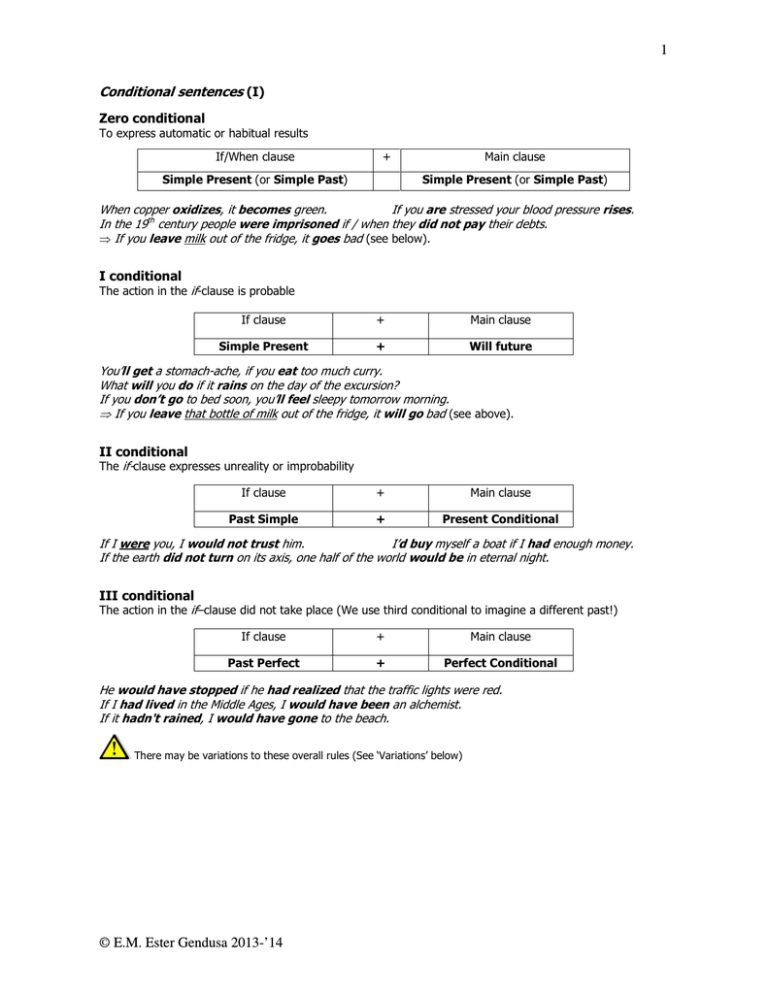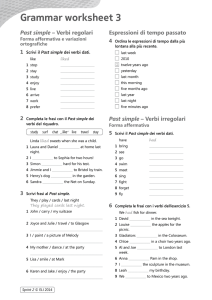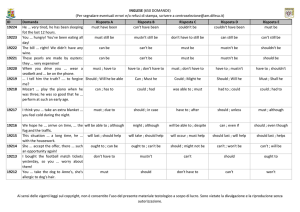Allegato 2 - Istituto Parentucelli
advertisement

1 Conditional sentences (I) Zero conditional To express automatic or habitual results If/When clause + Simple Present (or Simple Past) Main clause Simple Present (or Simple Past) When copper oxidizes, it becomes green. If you are stressed your blood pressure rises. In the 19th century people were imprisoned if / when they did not pay their debts. ⇒ If you leave milk out of the fridge, it goes bad (see below). I conditional The action in the if-clause is probable If clause + Main clause Simple Present + Will future You’ll get a stomach-ache, if you eat too much curry. What will you do if it rains on the day of the excursion? If you don’t go to bed soon, you’ll feel sleepy tomorrow morning. ⇒ If you leave that bottle of milk out of the fridge, it will go bad (see above). II conditional The if-clause expresses unreality or improbability If clause + Main clause Past Simple + Present Conditional If I were you, I would not trust him. I’d buy myself a boat if I had enough money. If the earth did not turn on its axis, one half of the world would be in eternal night. III conditional The action in the if–clause did not take place (We use third conditional to imagine a different past!) If clause + Main clause Past Perfect + Perfect Conditional He would have stopped if he had realized that the traffic lights were red. If I had lived in the Middle Ages, I would have been an alchemist. If it hadn't rained, I would have gone to the beach. There may be variations to these overall rules (See ‘Variations’ below) © E.M. Ester Gendusa 2013-’14 2 Conditional sentences (II) – Variations I conditional. The action in the if-clause is probable If clause Simple Present + + Main clause Will future You’ll get a stomach-ache, if you eat too much curry. What will you do if it rains on the day of the excursion? If you don’t go to bed soon, you’ll feel sleepy tomorrow morning. If clause Present Continuous Present Perfect Present Perfect continuous Main clause Modal verb (Present) Imperative If you are looking for your hat you’ll find it in the hall If you’ve finished writing the letter, I’ll post it for you. If you’ve been travelling all night, you must be exhausted. If she comes, she can use my PC. If you see her, tell her to phone me. II conditional. The if-clause expresses unreality or improbability. If clause Past Simple + + Main clause Present Conditional If I were you, I would not trust him. I’d buy myself a boat if I had enough money. If the earth did not turn on its axis, one half of the world would be in eternal night. If clause Past Continuous Should + verb base form Were to Main clause Modal verb (Present conditional) Present Conditional continuous Imperative If they weren’t working we could go for an outing to Leeds Castle. If you weren’t making all that noise I could sleep. If I had a car, I’d be touring Europe now. ⇒ Should accentua il grado dell’improbabilità: If you should decide to come, I’d be delighted. ⇒ Were to è spesso usato prima di un verbo d’azione e per dare un consiglio. - If Jack were to come back, what would you do? - If you were to use a smaller screwdriver, you’d have less difficulty. III conditional. The action in the if–clause did not take place (We use third conditional to imagine a different past!) If clause Past Perfect + + Main clause Perfect Conditional If I had lived in the Middle Ages, I would have been an alchemist. If it hadn't rained, I would have gone to the beach. He would have stopped if he had realized that the traffic lights were red. If clause Past Perfect continuous Modal verb Main clause Present conditional Perfect conditional continuous Modal verb If she had not refused that proposal, now she would be one of the richest women in the world. If you hadn’t been driving so fast the accident would never have occurred. He would have been a very good architect if he could have gone to university. If they hadn’t given us their seats we would have been standing all the time. If she had come, she could have met John. © E.M. Ester Gendusa 2013-’14 3 Nel periodo ipotetico le frasi subordinate possono essere introdotte, oltre che da if, anche da: supposing (that) [It. ‘supponendo che’]; suppose (that) [It. supponi che] ⇒ Supposing you went to live on a desert island, which books would you take with you? so long as [It. purché, nella misura in cui]; on condition that [It. a condizione che]; providing (that); provided (that) [It. ‘a patto che’] ⇒ She will put you up as long as / provided you consider it only a temporary arrangement. unless [It. ‘a meno che non’] ⇒ I would prefer not to come unless it is really necessary. Nelle frasi introdotte dalle suddette congiunzioni, oltre che da when, non si usa il will future. In linguaggio formale le frasi condizionali subordinate introdotte da if + subject + should, were e had possono essere costruite invertendo l’ordine soggetto/verbo ed eliminando if. Should you decide (= if you should decide) to buy the house, please, let us know as soon as possible. Had she taken (= if she had taken) more time to think, she might have acted more sensibly. Were it not (= if it were not) for the expense involved, I would accept your proposal. ************* Would prefer + infinitive – Would rather + verb base form Which would you rather be, a TV reporter or a TV newsreader? Which would you prefer to be, a TV reporter or a TV newsreader? I’d rather be a TV reporter. I’d prefer to be a reporter. Would rather Le forme condizionali del verbo preferire possono essere rese anche tramite WOULD RATHER, nelle seguenti costruzioni: a) quando il verbo preferire è seguito da un infinito: VERB BASE FORM Subject + WOULD /’D RATHER (not)+ HAVE + PAST PARTICIPLE (per il passato) I’d rather go out this evening than stay /instead of staying at home I’d rather not have gone out that evening, but they insisted. b) quando il verbo preferire è seguito da una proposizione oggettiva: SIMPLE PAST Subject + WOULD /’D RATHER + subject + PAST PERFECT (per il passato) I’d rather they left earlier (= I’d prefer them to leave earlier). I’d rather they had left earlier (= I’d have preferred them to leave earlier). ****************** © E.M. Ester Gendusa 2013-’14 4 Wish Nel registro formale TO WISH è seguito dalle seguenti costruzioni: a) VERB + INFINITIVE: He wished to be alone. b) COSTRUZIONE OGGETTIVA (vedi sopra): Do you really wish Mary to come with us? Sono tuttavia più comuni le seguenti costruzioni: c) per esprimere un desiderio improbabile o irrealizzabile ⇒ We use wish to say that we regret something, that something is not as we would like it to be: Subject + WISH + Subject + I wish I knew Paul’s number. I wish I could fly. ⇒ If only I knew Paul’s number… SIMPLE PAST PAST CONTINUOUS COULD + VERB BASE FORM I wish it were /was not raining. I wish I didn’t have to work. I wish you could stay for another two days. d) per esprimere rammarico dovuto ad un’azione verificatasi o meno nel passato: PAST PERFECT Subject + WISH + subject + COULD HAVE + PAST PARTICIPLE He wishes he had not refused that job. I wish I could have moved from this area. The weather was so cold while you were away. I wish it had been warmer. I wish I hadn’t eaten so much. e) per esprimere un desiderio la cui realizzazione dipende dalla volontà altrui o per esprimere irritazione verso un’azione compiuta da altri. Attenzione però: si tratta di cambiamenti e non di situazioni! Subject + WISH + subject + WOULD + VERB BASE FORM Compare and contrast the following examples: I wish it would stop raining. ≠ I wish it didn’t rain so often. I wish Sarah would come. ≠ I wish Sarah were here now. I wish somebody would buy me a bunch of flower. ≠ I wish I had a car. I wish you would not keep interrupting me. © E.M. Ester Gendusa 2013-’14 I wish you would do something instead of sitting on the sofa all the time.



